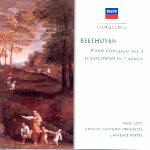Radu Lupu first came to international attention by taking first prize in the 1969 Leeds Competition. This paved the way for a recording agreement with Decca. Here is a reissue of Lupu’s all-Beethoven debut release for the label. In the C minor concerto, Lupu picks the solo part up by its radical scruff and shakes it out with unfettered confidence. To his credit, the pianist’s bravura never spills into anarchy–conductor Lawrence Foster sees to that. Foster supports his soloist with a grounded, transparent accompaniment that leaves no felicity of woodwind scoring unheard. Lupu’s wayward side, however, manifests itself in the 32 Variations. His slow-motion opening theme contrasts with the rapid-fire first variation. Likewise, the subsequent sections are subjected to dramatic extremes that undermine the music’s chaconne-like continuity and classical poise. In purely pianistic terms, though, it’s quite a hoot. Perhaps Lupu’s rhapsodic sensibility is more in keeping with Beethoven’s improvisatory side than I care to admit. Listen and decide for yourself.
































